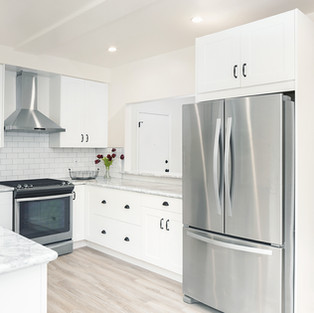Stand in your kitchen and take a deep breath. Smell that? From last night’s fish to your son’s nasty lacrosse pads (why did he leave them on the table?), you probably can’t detect any of your homes rankest odors. You’ve got nose blindness.
“You adapt to the smells around you,” says Dr. Richard Doty, the director of the Smell and Taste Center at the University of Pennsylvania.
On a sensory level, your processing mechanism becomes less sensitive to the continuous stimuli. Or, on a cognitive level, you can become habituated to the smells and basically learn to ignore them. Or you can do both.
Here are some of the most common nose blindness culprits, and how to ban them from your home.
Pet Funk
There’s one easy way to tell if your home smells like pets: Do you have them? Then yeah, unless you’re an obsessive cleaner and groomer, your abode has at least some Fido funk.
It could be pee, but more likely it’s just hair, gunky ears, and weeks-old slobber.
The first step to cleaning up pet smells is — sorry, pets — cleaning the pets themselves. Bathe and groom them regularly.
Then, vacuum, vacuum, vacuum. If they have a favorite couch or cushion, cover it with a blanket and run it — and the cushion cover — through the wash weekly. Every time you vacuum, start with a hearty sprinkle of baking soda on the carpet.
And use that crevice tool liberally; pet hair loves tight spaces like the border between the carpet and the wall, the edges of your steps and that little crack of space between the stove and your cabinets.
Hopefully urine isn’t the issue, but to be sure, you can use a black light to out any dried stains your pet was hoping you’d never notice.
Use more of that baking soda followed by a half-water, half-vinegar solution to neutralize the odor. Lots of people also swear by store-bought neutralizers, like Nature’s Miracle.
Mustiness
Fortunately, nose blindness only affects one of your senses, and you don’t need your nose to verify a basement with a musty smell.
Mustiness is caused by mildew and mold, which — for better or for worse — your eyeballs can easily detect. Do a careful inspection of your basement, from the darkest corner to the surface of every cardboard box or bookshelf. If you find gray or white splotches anywhere, it’s probably mildew. If it’s fuzzy, (oh no!) it’s mold.
First, you’ll want to bust up those existing odors. Then, you’ll want to make sure they never return. Some elbow grease with regular household cleaner will scrub away mildew. Bleach isn't the cure-all for mold. If often can exacerbate the problem.
To prevent mildew and mold from returning, consider running a dehumidifier or improving air circulation and sunlight exposure in the affected area if possible.
For chronic mustiness, you can deodorize rooms by setting out bowls of vinegar, cat litter, baking soda, or — as crazy as this sounds — an onion also will do the trick. Cut one in half and let it sit in a bowl in the room. The onion smell goes away in a few hours, and so will the dankness.
Smelly Bedding
Similar to pet odors, knowing if your mattress could smell is easy: Do you have a human body with skin and oils? Do you sleep on it?
Eventually, all the dead skin and body oils you shed while sleeping are going to build up, and stink they will, especially if your bedding is older.
You can’t exactly toss your mattress in the washing machine, so you’ll have to deal with it where it lies.
But it’s an easy fix: Sprinkle baking soda on it, let it sit for an hour or more, and then vacuum up the soda. (This works for memory foam, too.) Add a couple drops of essential oil to the soda (drip directly into the box and shake it well to mix evenly) for a pleasant smell. Bonus: Lavender has been shown to help you sleep.
Fridge and Freezer Grime
It’s your fridge and freezer’s job to keep your food fresh, but they need a little help staying fresh themselves.
Itty bitty food bits hang out long after you’ve tossed the item from which they came. Although you might not notice the odor creep, you may notice your ice starting to taste funny or see those food morsels start to accumulate in the corners of your fridge shelves.
If you see or taste something icky, you can bet others can smell something icky.
To zap odors from from your freezer and fridge, unplug and empty them and do a thorough cleaning with a mix of hot water and baking soda.
You can sanitize with a solution of one tablespoon bleach and one gallon of water. Let it air out for 15 minutes. Try wiping it down with vinegar for extra odor eliminating, or even leave the door open for a few days.
What better excuse is there for a long weekend away, or to treat yourself to takeout?
written by:
STACEY FREED
writes about homes, design, remodeling, and construction for online and print national trade and consumer publications, including “Better Homes & Gardens.” Previously, she was a senior editor at “Remodeling” magazine.







Comments